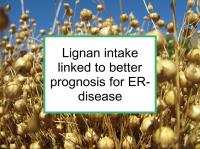A new study has reported that high circulating enterolactone levels reduce the risk of breast cancer mortality among postmenopausal women with estrogen receptor negative (ER-) breast cancer. Enterolactone is produced in the body from lignans found in foods such as flaxseed, whole rye, wheat bran, sesame seeds.
Lignans have been found to have both estrogen-dependent and non-estrogen-dependent anti-cancer properties and consumption has been associated with reduced postmenopausal breast cancer risk. However, there is little data concerning their effect on survival.
The study included 1,140 postmenopausal patients age 50 to 74 years who were diagnosed with breast cancer during the period 2002 to 2005. The authors tracked participant survival through year-end 2009 using local population registries. Deaths were verified with death certificates. Information concerning breast cancer relapses were obtained from and verified by clinical records and attending physicians. Study participants were followed for a median of 6.1 years.
The median enterolactone level for patients who died during the follow-up period was 17.0 nmol/L compared to 21.4 nmol/L for those still alive. A total of 162 deaths were confirmed during follow up.
Higher serum enterolactone levels were found to be associated with significantly reduced risks of distance metastasis and death. However, when the results were analyzed according to tumor estrogen receptor (ER) status, the highest quartile of serum enterolactone was found to be associated with a significantly reduced risk of death only among those with ER- tumors. A small risk reduction found for ER+ tumors, but it was not statistically significant.
